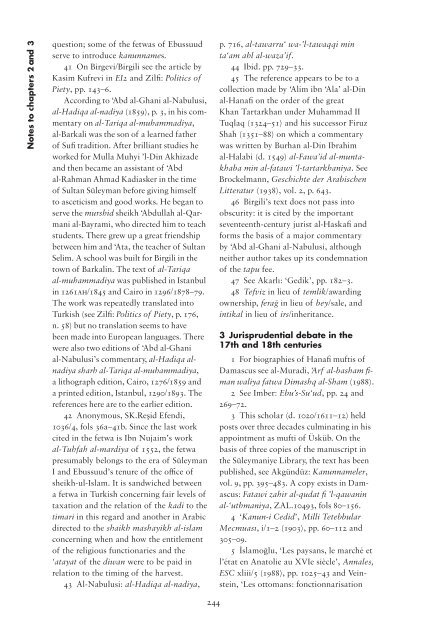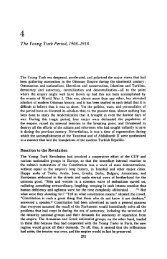Governing property, making the modern state - PSI424
Governing property, making the modern state - PSI424
Governing property, making the modern state - PSI424
You also want an ePaper? Increase the reach of your titles
YUMPU automatically turns print PDFs into web optimized ePapers that Google loves.
Notes to chapters 2 and 3<br />
question; some of <strong>the</strong> fetwas of Ebussuud<br />
serve to introduce kanunnames.<br />
41 On Birgevi/Birgili see <strong>the</strong> article by<br />
Kasim Kufrevi in EI2 and Zilfi: Politics of<br />
Piety, pp. 143–6.<br />
According to ‘Abd al-Ghani al-Nabulusi,<br />
al-Hadiqa al-nadiya (1859), p. 3, in his commentary<br />
on al-Tariqa al-muhammadiya,<br />
al-Barkali was <strong>the</strong> son of a learned fa<strong>the</strong>r<br />
of Sufi tradition. After brilliant studies he<br />
worked for Mulla Muhyi ’l-Din Akhizade<br />
and <strong>the</strong>n became an assistant of ‘Abd<br />
al-Rahman Ahmad Kadiasker in <strong>the</strong> time<br />
of Sultan Süleyman before giving himself<br />
to asceticism and good works. He began to<br />
serve <strong>the</strong> murshid sheikh ‘Abdullah al-Qarmani<br />
al-Bayrami, who directed him to teach<br />
students. There grew up a great friendship<br />
between him and ‘Ata, <strong>the</strong> teacher of Sultan<br />
Selim. A school was built for Birgili in <strong>the</strong><br />
town of Barkalin. The text of al-Tariqa<br />
al-muhammadiya was published in Istanbul<br />
in 1261AH/1845 and Cairo in 1296/1878–79.<br />
The work was repeatedly translated into<br />
Turkish (see Zilfi: Politics of Piety, p. 176,<br />
n. 58) but no translation seems to have<br />
been made into European languages. There<br />
were also two editions of ‘Abd al-Ghani<br />
al-Nabulusi’s commentary, al-Hadiqa alnadiya<br />
sharh al-Tariqa al-muhammadiya,<br />
a lithograph edition, Cairo, 1276/1859 and<br />
a printed edition, Istanbul, 1290/1893. The<br />
references here are to <strong>the</strong> earlier edition.<br />
42 Anonymous, SK.Reşid Efendi,<br />
1036/4, fols 36a–41b. Since <strong>the</strong> last work<br />
cited in <strong>the</strong> fetwa is Ibn Nujaim’s work<br />
al-Tuhfah al-mardiya of 1552, <strong>the</strong> fetwa<br />
presumably belongs to <strong>the</strong> era of Süleyman<br />
I and Ebussuud’s tenure of <strong>the</strong> office of<br />
sheikh-ul-Islam. It is sandwiched between<br />
a fetwa in Turkish concerning fair levels of<br />
taxation and <strong>the</strong> relation of <strong>the</strong> kadi to <strong>the</strong><br />
timari in this regard and ano<strong>the</strong>r in Arabic<br />
directed to <strong>the</strong> shaikh mashayikh al-islam<br />
concerning when and how <strong>the</strong> entitlement<br />
of <strong>the</strong> religious functionaries and <strong>the</strong><br />
‘atayat of <strong>the</strong> diwan were to be paid in<br />
relation to <strong>the</strong> timing of <strong>the</strong> harvest.<br />
43 Al-Nabulusi: al-Hadiqa al-nadiya,<br />
244<br />
p. 716, al-tawarru‘ wa-’l-tawaqqi min<br />
ta‘am ahl al-waza’if.<br />
44 Ibid. pp. 729–33.<br />
45 The reference appears to be to a<br />
collection made by ‘Alim ibn ‘Ala’ al-Din<br />
al-Hanafi on <strong>the</strong> order of <strong>the</strong> great<br />
Khan Tartarkhan under Muhammad II<br />
Tuqlaq (1324–51) and his successor Firuz<br />
Shah (1351–88) on which a commentary<br />
was written by Burhan al-Din Ibrahim<br />
al-Halabi (d. 1549) al-Fawa’id al-muntakhaba<br />
min al-fatawi ’l-tartarkhaniya. See<br />
Brockelmann, Geschichte der Arabischen<br />
Litteratur (1938), vol. 2, p. 643.<br />
46 Birgili’s text does not pass into<br />
obscurity: it is cited by <strong>the</strong> important<br />
seventeenth-century jurist al-Haskafi and<br />
forms <strong>the</strong> basis of a major commentary<br />
by ‘Abd al-Ghani al-Nabulusi, although<br />
nei<strong>the</strong>r author takes up its condemnation<br />
of <strong>the</strong> tapu fee.<br />
47 See Akarlı: ‘Gedik’, pp. 182–3.<br />
48 Tefviz in lieu of temlik/awarding<br />
ownership, ferağ in lieu of bey/sale, and<br />
intikal in lieu of irs/inheritance.<br />
3 Jurisprudential debate in <strong>the</strong><br />
17th and 18th centuries<br />
1 For biographies of Hanafi muftis of<br />
Damascus see al-Muradi, ‘Arf al-basham fiman<br />
waliya fatwa Dimashq al-Sham (1988).<br />
2 See Imber: Ebu’s-Su‘ud, pp. 24 and<br />
269–72.<br />
3 This scholar (d. 1020/1611–12) held<br />
posts over three decades culminating in his<br />
appointment as mufti of Üsküb. On <strong>the</strong><br />
basis of three copies of <strong>the</strong> manuscript in<br />
<strong>the</strong> Süleymaniye Library, <strong>the</strong> text has been<br />
published, see Akgündüz: Kanunnameler,<br />
vol. 9, pp. 395–483. A copy exists in Damascus:<br />
Fatawi zahir al-qudat fi ’l-qawanin<br />
al-‘uthmaniya, ZAL.10493, fols 80–156.<br />
4 ‘Kanun-i Cedid’, Milli Tetebbular<br />
Mecmuası, i/1–2 (1903), pp. 60–112 and<br />
305–09.<br />
5 İslamoğlu, ‘Les paysans, le marché et<br />
l’état en Anatolie au XVIe siècle’, Annales,<br />
ESC xliii/5 (1988), pp. 1025–43 and Veinstein,<br />
‘Les ottomans: fonctionnarisation












